TOURIST INFORMATION
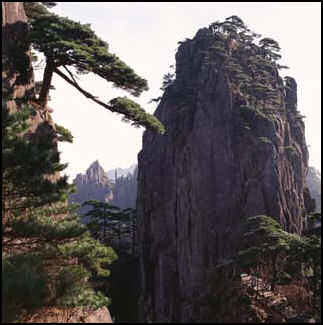
Huangshan
The official government tourist organization is known as China International Tourist Service (CITS) in China and China National Tourist Office (CNTO) outside of China. In New York : Lincoln Building, 60 E. 42nd St., Suite 3126, New York, NY 10165, tel. (888)-760-821, (212)-867-0271, fax: (212)-599-2892. In Los Angeles : 333 West Broadway, Suite 201, Glendale CA 91024, tel. (818)-545-7505, fax: (818)-545-7506.
In the UK : 4 Glentworth St. London NW1, tel. (071)-935-9427, fax: (071)-487-5842. In Australia : Floor 11,55 Clarence St, Sydney NSW 2000, tel. (02)-299-4057, fax: (02)-290-1958. In Hong Kong : 6th Floor, Tower 2, South Seas Center 75, Mody Road, Tsim Sha Tsui, Kowloon, Hong Kong, tel. 732-5888, fax: 721-7154. In China :No. 9A, Jian Guo Men Nei Ave. 100740, Beijing, tel. (1)-531-8866, fax: (1)-512-2096.
Web Sites : China National Tourist Office (CNTO): CNTO : Discover China: China Vista ;Travel China Guide Travel China Guide ; China Highlights China Highlights ;Lonely Planet China Lonely Planet China ; China news Web site: Sina.com; Sina.com . Traveler bulletin board: Lonely Planet’s Thorn Tree Thorn Tree
Tourist Offices In China : There are generally only local tourist offices in places visited by lots of foreigners. Sometimes they are located at the airport or in and around the train or bus stations. These offices tend not to be very helpful and are little more than outlets for local tourist companies. Sometimes they provide tourist information and schedules for buses, trains ad public transportation; give direction to sights; and help you choose a restaurant and find a hotel.
EMBASSIES
U.S. Embassy in China : Xiu Shui Bei Jie 3, 100600 Beijing. tel. [86]-(10)-6532-3831, fax: [86]-(10)-6532-3178. There are also consulates in Chengdu, Guangzhou, Shanghai, Shenyang, Hong Kong and Macau. Chinese Embassy in the United States : 2300 Connecticut Ave. NW, Washington DC 20008, tel. (202)-328-2500. There are consulates in Chicago, Houston, Los Angeles, New York and San Francisco.
TRAVEL DOCUMENTS
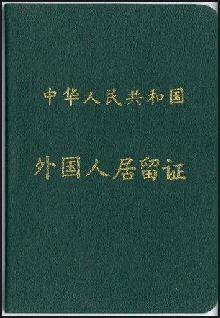
residency document
for foreigner
A passport (valid for at least six months after arrival) and visa are necessary for citizens of the United States, Canada, Australia, and most other countries. Even if you are just flying through China you need a transit visa...but at least you no longer need an invitation from the government or have to be a member of a tour group to enter China as you did in the past. Make sure you have a visa before you enter China. If you don’t have one you may be placed on first plane out after you arrive. For more information check the Travel Document Systems Web site Traveldocs
Visas
China no longer requires visas from citizens of some countries such as Japan. A visa agreement between China and all EU members made in 2005 has made it much easier for EU members to travel to China and Chinese to travel to Europe. China maintains its visa policy even though dropping it would increase tourism in part to keep a close eye on who enters the country and keep troublemakers out.
Chinese visas for Americans are generally expensive (US$30 in the United States, and around US$50 or more in other countries) and usually takes three days to a week to process. Visas can be often be obtained in a couple of days but the cost for rush service often exceeds US$200. In any case, it pays to plan ahead and often it is worth paying a tourist agency a fee to obtain the visa for you. Even though it is still possible to enter Hong Kong without a visa you need a Chinese visa to enter China from Hong Kong.
Most visas are single entry visas for 30 days. Multi-entry visas or visas for longer periods of time are sometimes available but they are often expensive and not every embassy or consulate issues them. The visa situation often changes so it is a good idea to check with a Chinese embassy or consulate directly for the latest information. If you want to go to a restricted area like Tibet, often you will need special permission. This permission may be obtained from the embassy, consulate or the Foreign Affairs Branch of the Public Security Bureau in Beijing. Check with embassy on the latest information about this as well.
Some people get their Chinese visas in Hong Kong but the process still takes at least a couple of days. One advantage with Hong Kong is that it is easier to get multi-entry visas or visas for long periods of time. In Hong Kong 30 day visas can be obtained from numerous travel agencies as well as diretcly from the visa office of the Ministry for Foreign Affairs (Floor 5, Low Block, China Resources Building, 26 Harbour Road, tel.2827-1881). China Travel Service (CTS, 78-83 Connaught Road or 27-33 Nathan Road) is an easy place to get multi-entry visas or visas for long periods within a couple days.
Visa Requirements
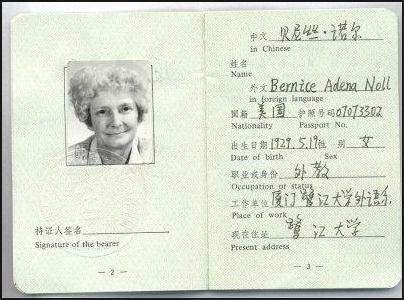
residency document for foreigner
To get a tourist visa you must the present the following items to a Chinese embassy, consulate or mission: 1) your passport; 2) one, two or three passport-size photographs; 3) two filled-out application forms; and 4) a visa fee, generally paid in cash.
The application process is sometimes smoother if you have the name of hotel in China or a Chinese contact written on your application form. You may also have to provide a copy of your round trip plane ticket, travel itinerary, or a letter from a travel agent stating you will be in possession of a round trip ticket. If you are mailing in your passport include a self addressed, stamped envelope with a prepaid Express Mail, Federal Express, DHL, UPS or Airborne Express sticker on it.
If you want to work, study or do business in China you will most likely need a visa and these visas generally require sponsorship of a person, institution or company in China. For information on work permits, business visas, student visas and immigration contact a Chinese embassy or consulates.
Visa Extensions are generally relatively easy to obtain. They are given out by the Foreign Affairs Office or the “Allens Entry Exit Department” of the local Public Security Bureau (PSB), the local police. The fee for visa extensions is generally not very high but usually travelers are allowed only one extension of one month. Most cities and large towns have a PSB office. The first visa extension of one month is generally easy to get but the second extension is more difficulty and can cost from 300 to 600 RMB. If you overstay your visa it will cost 500 RMB per day.
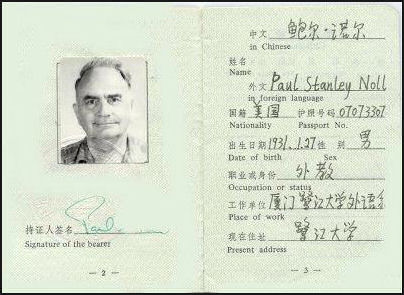
residency document for foreigner
In Beijing, extensions are granted at the PSB office at 2 Andingmen Dong Daije, 300 meters eats of Yonghe Gong subway stop. The extension takes a week to process and the PSB office keep your passport during that time.
Round Trip or Onward Ticket is sometimes required. Proof of Sufficient Funds is generally not but may be required. Taking in Expensive Electronic Equipment (like video cameras and laptop computers) See Appendix III: Electronic Equipment. Airport Tax (Departure Tax) : Airport construction fees were ended in 2004. They caused delays of 10 to 15 minutes at airports.The US$10 fee on international flights has been added to airplane ticket prices. Currency Restrictions : China used to have a system using Foreign Exchange Certificates (FECs) but this system is no longer used. Currency Declaration Forms are no longer given out. Inoculation Records : See "HEALTH."
Regions Open to Tourists : Travel to certain areas of China is restricted, more areas of the country are open to tourists than a few years ago.
Visiting Tibet: Visitors to Tibet, whether as individual travelers or members of group, are resticted from traveling to many areas on the region. Areas that are open to foreigners include: Lhasa, Shigarze (Xigaze), Naqum Zedong, Zhang Muxkhasa and the main roads and train routes between these points. Special permission to visit any of the closed areas must be obtained from the region’s public security bureau. Occasionally, visitors are refused admission or have difficulty entering Tibet from Nepal
Lost Passport: Make sure to make photocopies of your passport and visa. If your passport or visa is lost or stolen you generally have to report the theft to police before you can get a new one. Embassies on consulates can give you advise on what you have to do. Check Web site for U.S. Department of State Passport Services and Information:
Customs: Two liters of alcohol and 400 cigarettes can be brought in duty free. Sometimes Bibles and religious materials and other publications deemed pornographic or “detrimental to China’s politics, economy culture or ethics” are seized from people arriving in China. Taking out valuable cultural relics and rare books relating to the Chinese revolution, history, culture and art os prohibited. Antiques that have been apprvoed for export are marked with a red wax seal.
MONEY
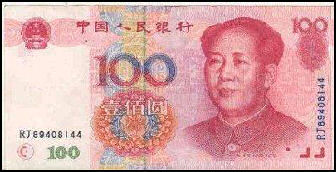
China is very cheap by American and European standards. It is relatively inexpensive in terms of budget accommodation, buses, taxis and cheap restaurant food. Backpackers can live on around US$20 to US$30 a day. Accommodation is the biggest expense in the cities. There isn’t much guest house accommodation but there are US$20-a-night cheap hotels and lots of good, inexpensive restaurants. In backpacker towns there is wide choice of cheap guesthouses. A large, tasty meal at a local restaurant often costs less than US$2.00 and a single room in a guesthouse or mini-hotel often is less than US$5.00.
Top end hotels and meals at fancy restaurants are comparable in price to those in the United States. Rooms in tourist hotels go for between US$40 and US$60. Doubles in a five-star hotel generally go for between US$150 and US$200. There are sometimes different prices for foreigners and Chinese. Some tourists complain about this (and the pushy nature of some hawkers) but even foreigner prices are pretty reasonable.
The currency of China is called yuan, the Renminbi (RMB), or kuai. One yuan is divided into 10 jiao or mao (fen, or cents are no longer used).
Initially tourist yuans looked like "cigarettes coupons from '50s." The had images of scenic areas on one side and instructions how to use them on the other. The yuan used by ordinary Chinese had images of factories and happy rural workers,
Denominations: Almost all the money used in China is paper. There are 1, 2 and 5 jiao banknotes and 1, 2, 5, 10, 50 and 100 yuan banknotes. One jiao coins exist but you don't see them often. Exchange Rates: 6.82 yuan equals the dollar and .142 dollars equals one yuan in May 2009. The yuan has been fixed at a rate of 8.3 yuan to dollar from 1994 to 2005. Inflation Rate has been between 5 and 6 percent during the 200s. Per Capita GNP (2007):US$1,740. The per capita income in the United States is around US$40,000. Latest Exchange Rates: Oanda Oanda ; Xe.com XE
Where to Change Money
Money can be changed at banks, hotels, airport banks, and with moneychangers. Most people change their money at banks or with moneychangers. Moneychangers are more convenient and they usually have better rates than banks. You generally need your passport when you exchange money. Make sure you have enough cash for the airport tax at the end of the trip.
The rates vary somewhat so shop around. Sometimes the paperwork necessary to change money at a bank is laborious and time consuming. The rates at hotels and the airport are generally the not very good. Beware of places with good rates, they often charge a high commission, and watch out for places with a low commissions, they usually have bad rates. Moneychangers often only deal with cash.
As a rule don’t change money in your home country. Wait and change it after you arrive in the country you are traveling in. The exchange rates are usually better there. Also change money back into local currency in the country in your traveling; don’t change it back in your home country.
Currency Warnings and Advise
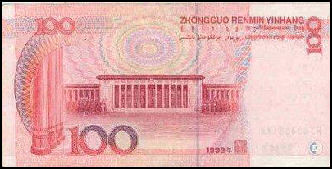
1) Dollars are preferable to other foreign currencies. Bring lots of crisp new US$1, US$5, US$10 an US$20 bills for small denomination exchanges and payment with cash. Banks and exchange houses may reject dollar banknotes that look worn. 2) Travelers checks and credit cards are difficult to use in many places in China; American dollars in cash are more readily accepted.
3) Try not to change too much of your money into local currency. Sometimes your money will go farther than you think and it can be difficult to change sums back into foreign currency and get a descent rate. Hang on to your exchange receipts in case you need them to change local currency back into foreign currency.
4) Try to change big banknotes into small banknotes whenever you get a chance. Shop owners sometimes have difficulty changing large bills. Don't accept torn bills. 5) Always keep some small change in your pockets to pay the restroom attendants. One dollar bills are handy for tips, small purchases and baksheesh payments. 6) Stores clerks often try to wrangle over money with foreigners even when there is a set price. 7) Also remember it can be difficult to change money in rural areas and smaller towns so stock up on Chinese yuan while you are in the cities.
8) There is a lot of counterfeit money in circulation, Even small shops have machines that check whether banknotes are authentic. In 2006, the Chinese government issued a warning to be on the look out for counterfeit US$100 bills. There has also been a dramatic increase in the amount of counterfeit Chinese currency, especially 100 yuan notes. To avoid getting counterfeit money hold the bills up to the light, counterfeit bills generally don’t have watermarks, plus the paper feels funny.
Currency Restrictions: Travelers can take a maximum of 20,000 yuan (worth about US$2,400) out of China and bring in the same amount according to new rules introduced in December 2004. Amounts of foreign currency over US$5,000 have to be declared when entering the country.
Foreign Exchange Certificates (FEC's) were a special form of currency set up for foreigners to keep them from exchanging money on the black market. FEC are no longer used in China.
Travelers Checks and ATMs
Travelers Checks can be exchanged for Chinese currency at most banks. Hotels will also cash them for their guests for a fee. Rates given for travelers checks are often slightly higher than those given for cash. It is a good idea to bring some small denomination travelers checks in case you need a small amount of money in a squeeze. American Express travelers checks are the most widely accepted ones. You generally can not use U.S. dollar travelers checks or travelers checks in marks to buy stuff though.
Credit Cards are used in China but are not nearly to the degree they are used in the United States. Some places that accept credit cards make it a hassle to use to use them. They are generally accepted at major hotels, stores, shops that cater to tourists, restaurants, airlines, trains, car rental agencies, and many other businesses. Visa, Mastercard and American Express are the most widely accepted credit cards. Some cards can be used to get cash from ATM machines.
Before you travel alert your credit card company that you are traveling abroad so you can prevent your account from being frozen for “abnormal” use. Carry a couple credit cards with you — preferable in separate places — in case one is stolen or lost.
Credit cards are good for the purchases of big ticket items. Visa and MasterCard cards generally charge a one percent currency conversion fee on purchases made overseas (in addition some banks will charge an additional two or three percent). . In return the credit card company will protect you against unauthorized charges, billing errors and misrepresentation with proper documentation.
ATMs are widely available at banks and in main shopping areas but many do not accept Western credit cards. They generally require users to have an account at a bank in China. Your best bet is to use a Citibank office. Most post offices in places frequented by tourists and many branches of the Bank of China, the Industrial and Commercial Bank of China, China Construction Bank and Agricultural Bank of China have ATM.s that accept foreign credit cards using Cirrus or Plus networks.
ATMs in many ways are easer to deal with than credit cards, cash advances or travel’s checks. If nothing else you can avoid waiting in long bank lines. Many travelers use credit cards and ATM machines to avoid the cost of currency conversions. The rates given at an ATM machine are generally as good or better than those offered at exchange houses and banks. Try to use ATMs affiliated with major international banks to avoid poor exchange rates or inflated fees. Typically your bank back home will charge you US$2 or US$3 for each transaction.
International credit cards and ATM cards will work as long as they have a four-digit PIN number encoded. Check with you bank for details on using foreign ATMs before leaving home. Many ATMs abroad have only numbers not letters on their keypads so work out in advance the numeric equivalent of your password.
It is good idea to not to be totally reliant on ATMs sp bring some travelers checks and cash as a back up. Some travelers have problems locating ATM machines when they need them and sometimes their cards don't work because they don’t have a data chip in them.
ATM Locator Web sites: Mastercard: Mastercard
Black Market: The currency is fairly stable so China doesn’t really have one. In the old days unlicensed currency traders, known as “hunag niu” (yellow cattle), sometimes gather around banks. They offer rates that are only slightly better — and sometimes worse — than the official rates. Some are still around. They are best avoided out of concern of getting ripped off or being passed counterfeit money.
Student Discounts are sometimes offered at monuments and museums. International Student Identification Cards are available. See the Lonely Planet guides for information.
Tipping is generally not practiced and is technically illegal (See Consumer Customs, Economics) A small tip is given to hotel porters and taxi drivers for luggage. Taxi drivers are usually not tipped but sometimes they expect tips from foreigners. Tipping is practiced at many fancy hotels. Sometimes tips or gifts are given to tour guides and hotel personnel that have been especially helpful. Cigarettes are often given a tip.
Hotels and Restaurants: Service charge and tax is added at some upscale hotels and restaurants. There is generally no service charge at cheap restaurants.
Tax: China has a 17 percent value added tax (VAT). 2004. It is levied on most goods and services (but not supermarket food) and is usually included in the selling price.
Bank Hours: See "Time Facts". Wiring Money: See Appendix VI.
BOOKS AND MAPS
Numerous travel book publishers have released guidebooks on China. There is also a variety of books dealing with different regions or different subjects and themes such as art, history, religion and food. Budget Travelers: The various Lonely Planet and Rough Guide guides are good. These guides have lists of cheap accommodation and restaurants as well as descriptions of the sights and lots of information about China. Pictures: Insight/APA Guides Vacation Tourists. Frommer's and Fodor’s guides.
Books on China Web Sites: China Books China Books ; Amazon Amazon ; China Travel Guide: China Travel Guide ;
Maps: Maps of China.com maps-of-china.com ; Maps of China.net Maps of China , University of Texas , Maps.com Maps.com ; Google Maps Google Maps
Pleasure Reading:
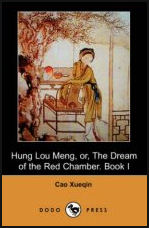
”River Town: Two Years on the Yangtze” by Peter Hessler (HarperCollins, 2001); “Oracle Bones: A Journey Between China’s Past and Present” by Peter Hessler (HarperCollins, 2004); “South of the Clouds: Exploring the Hidden Realms of China” by Seth Faison. “Riding the Great Rooster by Paul Theroux. “Single Pebble” by Jon Hersey are recommended.
Classic novels include “The Dream of the Red Chamber” by Cao Xueqing, who is sometimes called the Chinese Tolstoy; “The Rickshaw Boy” by Lao She; a delightful novel written in the 1930s about a Beijing rickshaw driver; “The Good Earth” by Pearl S. Buck; “Red Sorghum”, which was made into a famous movie, by Mo Yan; “Raise the Red Lantern, which was also made into a famous movie (See Film), by Sun Tong.
”Journey to the West”, a 16th century novel by Wu Cheng En, has many similarities with the “Wizard of Oz”. It is based on the 7th century wanderings of real life Buddhist monk named Hssuan-tang Zang who went to India in search of sacred Buddhist texts. In the story the Great Monk Tang is accompanied on his journey by three animal spirits: the dim-witted and awkward Pigsy (a pig), the Monkey King (an immortal that possesses a monkey) and the water spirt monk Sha (a feminine spirit).
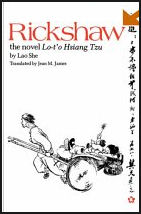
Books on Cultural Revolution: “Wild Swans” by Jung Chang, an international bestseller; “ Ten Years of Madness: Oral Histories of the Cultural Revolution” and “One Hundred People's Ten Years” by Feng Jicai. “The Execution of Mayor Yin and Other Stories from the Great Cultural Revolution” by Chen Jo-his; “Life and Death in Shanghai” by Nien Chang; “Enemies of the People” by Anne F. Thurston.
”Colors of the Mountain” by Da Chen (Random House, 2000) is a coming-of-age set in the Cultural Revolution. It was described by Newsweek as "surprisingly free of cynicism or bitterness...all the more poignant by the wonder and vulnerability in the voice of their child narrator." “The Lily Theater: A Novel of Modern China” by Lulu Wang is an entertaining and interesting depiction of the Cultural Revolution originally written in Dutch by a Chinese woman with a strong, eccentric voice.
”Waiting” is Ha Jin is about a doctor who waits 18 years. to get a divorce so he can marry the woman he loves. Much of it set during the Cultural Revolution. Critics have compared Critics have compared the book with works by Russian masters like Gogol and Chekhov.
Amy Tan is a San-Francisco-based Chinese-American writer who bestsellers about life in China and life for Chinese -Americans in the United States. Her books — “The Joy Luck Club” (1989), “The Kitchen God's Wife” (1991), “The Hundred Secret Senses” (1995), “The Bonesetter's Wife” (2001), “Opposite of Fate” — often explore the relationships between Chinese-born mothers and their yuppie Chinese-American daughters and mystical aspects of Chinese culture.
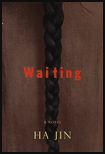
”Life and Death Are Wearing Me Out” by Mo Yan ( 2008 Arcade Publishing ) is a first rate novel, that in the words of Yale historian Jonathan Spence, “covers almost the entire span of his country’s revolutionary experience from 1950 to 2000.” The five narrators in the book are animals — an ox, a pig, a donkey, a dog and a monkey — who are the successive reincarnations of a man named Ximen Nao.
“Wolf Totem” is a novel that sold millions of copies in China and won the Man Asian Literature Prize. Written by Jiang Ring, a former Red Guard who spent much of the 1970s in Inner Mongolia, it is about a man much like the author who is sent to Inner Mongolia to teach the herdsmen there. During his stay he is the one who receives an education--about life on the steppe, especially wolves who are despised for killing the herdsmen’s animals but are revered. Central episodes include adoption of a wolf cub by the main character and a ferocious battle between a starving wolf pack and a herd of wild horses.
”Red Dust” by Ma Jian was described by Pankaj Mishra in The New Yorker as “the most vivid description of the Chinese people freshly liberated from Maoism, picking their way through a transformed moral landscape in which extreme poverty and repression coexist with alluring new possibilities of self invention.” The book “seethes with the fraught humanity of a people lurching between credulousness and opportunism, deprivation and semi-bourgeois respectability.”
Cultural Revolution and Mao Zedong Books
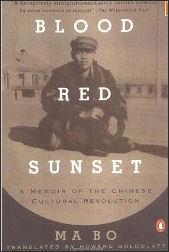
Books on Cultural Revolution include “Wild Swans” by Jung Chang, an international bestseller; “Ten Years of Madness: Oral Histories of the Cultural Revolution” and “One Hundred People's Ten Years” by Feng Jicai; “The Execution of Mayor Yin and Other Stories from the Great Cultural Revolution” by Chen Jo-his; “Life and Death in Shanghai” by Nien Chang; “Enemies of the People” by Anne F. Thurston.
“Colors of the Mountain” by Da Chen (Random House, 2000) is a coming-of-age set in the Cultural Revolution. It was described by Newsweek as "surprisingly free of cynicism or bitterness...all the more poignant by the wonder and vulnerability in the voice of the child narrator." “The Lily Theater: A Novel of Modern China” by Lulu Wang is an entertaining and interesting depiction of the Cultural Revolution originally written in Dutch by a Chinese woman with a strong, eccentric voice.
A rare glimpse into Mao's personal life was furnished in “The Private Life of Chairman Mao”, a 1994 book written by Dr. Li Zhisui, Mao's personal physician for nearly 22 years. Dr. Li often slept in a small room next to Mao's ballroom-size bedroom, traveled with him and had many late night conversations with him. Born into a family of physicians, including two who served the Chinese emperor, Li was trained at an American-financed medical school in China and worked as a ship's surgeon in Australia for one year. He began working for Mao when he was 35 years old. He sometimes taught the chairman English. [Source: "The Private Life of Chairman Mao" by Dr. Li Zhisui, excerpts reprinted U.S. News and World Report, October 10, 1994]
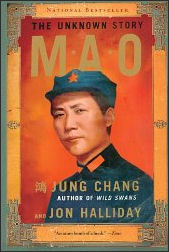
Li filled 40 notebooks with observation of Mao in the 1950s and 60s, but he burned these out of fear of reprisals during the Cultural Revolution. After Mao died in 1976 the doctor began writing what he remembered and this time he filled 20 notebooks. In 1988, he fled to Chicago where his two sons lived, and in 1989 he promised his wife on her deathbed that he would record his story for his children and later generations. After the book was published, Zhisui's publisher, Random House, was attacked by Chinese authorities for producing a book “awash in lies and malice."
Other books about Mao Zedong: “ Mao Fever and the Story of a Mao Book “ by Ross Terrill ; “ Mao: A Biography “ by Ross Terrill. “Mao: the Unknown Story” (Knopf. 2005) by Jung Chang, author of “Wild Swans”, and her husband John Halliday, a British historian, portrays Mao as villain on the level of Hitler and Stalin. The book was read by U.S. President George Bush and embraced by the American right as a condemnation of Communism. It characterizes Mao as cruel, materialistic, self-centered and a leader who used terror with the aim of ruling the world. There is also a Mao biography by Jonathon Spence.
Recommended Books About China by Foreign Writers
Books by non-Chinese writers recommended by Jeffrey Wasserstrom in The Guardian: “ Factory Girls “ by former Wall Street Journal correspondent Leslie T. Chang offers moving life stories and highly individualized portraits of workers the author befriended during visits to the massive industrial boomtown of Dongguan made over several years. “ The Last Days of Old Beijing “, Michael Meyer's poignant, historically minded work, looks at life in a Chinese alleyway neighborhood slated for destruction. It is based on the former Peace Corp volunteer's extended stay in the district, where he rented a cramped room that lacked indoor plumbing (but had an internet connection) and taught English for free (mostly to the children of migrant laborers) at a local elementary school. [Source: Jeffrey Wasserstrom, The Guardian, December 25, 2008]
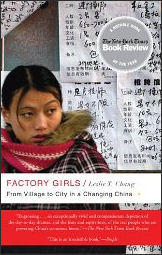
“ Out of Mao's Shadow “ , a model work of investigative political journalism by the Washington Post's Philip P Pan has many virtues, including that of introducing readers to the work and life of the daring documentary filmmaker Hu Jie and a Sichuan graveyard devoted to victims of Cultural Revolution violence. And finally, “ Smoke and Mirrors “ is Pallavi Aiyar's lively set of reflections on her experiences as the first Beijing-based Chinese-speaking correspondent for an Indian daily. Filled with amusing anecdotes, one of its strengths is the author's nuanced assessment of the contrasting attitudes toward manual labor, political expression, and gender in China and India.
Classics from the “golden age? of foreigners writing about China from the the mid-1930s to the 1950s included Emily Hahn's “ China to Me “ , Jack Belden's “ China Shakes the World “ , Graham Peck's classic 1950 memoir “ Two Kinds of Time “, Annalee Jacoby and Theodore White's “ Thunder Out of China “ and multiple titles by Edgar Snow, Agnes Smedley, and Carl Crow.
Also recommended are Ian Johnson's “ Wild Grass “ (2005) , a superb work of dissent-focused reportage; “ The Changing Face of China “ (2005) , the latest in a series of thoughtful books on Chinese themes by long-time Guardian correspondent John Gittings; Rachel DeWoskin’s 2005 memoir, “ Foreign Babes in Beijing “, a sharp and funny account of a young American woman’s life in China during the late 1990s; John Pomfrett's often moving “ Chinese Lessons: Five Classmates and the Story of the New China “ (2006), James Kynge's wide-ranging “ China Shakes the World: The Rise of a Hungry Nation “ (2006); Duncan Hewitt's “ Getting Rich First “ (2007); Rob Gifford's “ China Road “ (2007)]
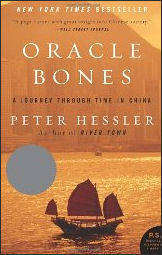
Peter Hessler has written three good books about China: River Town (2001), Oracle Bones: A Journey Between China's Past and Present (2006) and Country Driving: A Journey Through China From Farm to Factory (2010) Books form the 1980s include Paul Theroux’s Riding the Iron Rooster: By Train Through China (1988), Vikram Seth’s From Heaven Lake, and Mark Salzman’s Iron and Silk
”The Maker of Heavenly Trousers” by Danielle Vare, an Italian diplomat that lived in China in the 1920s and 30s, was described by the Washington Post “as a charming take on the complexity of Chinese society.”Asia-American writers Gaily Tsukiyama and Lisa See have had some success writing about historical China. “Shanghai Girls “ by Lisa See (2009) follows two sisters in the their journey from glamorous 1930s Shanghai to Los Angeles after the Japanese invasion of China.
The Detective Dee stories made famous in the west by writer Robert van Gulik are a series of mystery novels loosely based on a historical Tang Dynasty investigative magistrate. On the eve of the Empress Wu Zetian’s formal coronation, one story goes, officials responsible for the construction of a massive Bodhisattva statue in her honor start mysteriously bursting into flame. Dee is summoned from prison/exile (he had previously opposed what he considered to be Wu Zetian’s usurpation of the Tang imperial throne) to the capital Chang’an to solve the mysteries. Aided by the Empress’s bodyguard and albino investigator Dee proceeds methodically to demolish the haze of superstitious beliefs provoked by the murders, and zeroes in on a scientific and political explanation.
TELEPHONES
China Telecom is China’s largest fixed line phone service provider. It operates in 21 southern provinces and municipalities. China Netcom is China’s No. 2 fixed line phone service. It operates in 10 northern provinces, including Beijing. China Mobile is the largest cell phone company. Foreigners often make calls at offices run by China Post.
Domestic phone numbers in large cities have eight digits. In other places the numbers have seven digits. Never less. Mobile phone numbers have 11 digits and no area codes and usually begins with 13. Directory assistance is 114.
Calls can be made from post offices, phone offices, homes, and business or hotel phones. Shop owners will often let you use their phone for a local call if you are in a pinch. Cell phones are widely used in China. They can be rented in some places. Many people by prepaid “sims” cards from China Mobile on a cheap cell phone they bring from home. In rural areas the cell phone reception is often only good if you climb a hill. In remote areas calls are often made through satellite phones or radio relay systems.
The telephone system in China is not up to Western standards but not so bad if you know the numbers you need to call. Chinese answer the phone saying “Nee hao” (“Hello”). Operators at major hotels usually speak English. Local call are best made from a hotel or guesthouse with the help of a Chinese person.
Long Distance Calls in China: For long distance calls within China dial 0, then dial the area code and number. For information on area codes see the Wikipedia site on the subject: Wikipedia . Sometimes hotels add a considerable surcharge for long distance calls.
International Calls can be made from hotels, telephones offices, some post offices, private homes or phones set up on the streets with international direct dial (IDD). Special international-call phones booths and telephone card booths are generally found only at the airports or fancy hotels or places with lots of tourists. Calls made from China can be expensive. Prepaid calling cards are good for calling home and making international calls because the card’s limit will prevent you from talking longer and spending more money than you anticipated.
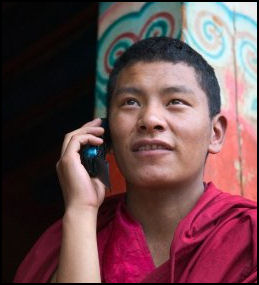
China is connected by direct dial to the U.S. and Europe. When dialing an international call directly dial 00 (001 from Hong Kong), then the country code, area code and number. Long distance calls occasionally must be put through long distance operators.
International Call from a Hotel: Many hotel rooms have their own private lines with IDD. People can call you directly without going through the hotel operator. Other require you to calls through the operator. Exercise caution about making long distance calls at a hotel. Some hotels charge US$5 a minute or more, and stick guests with phone bills of several hundred dollars.
International Calls from a Telephone Office: Cities and large towns generally have main telephone offices run by China Post. Towns and villages — and some cities too — often have post offices with a place for making long distance and international telephone calls. In many places there are private communications offices or phones set up on the streets where phone calls can be made with relative ease. These are usually better than government telephone offices.
Calling from a telephone office or post offices can sometimes be a big hassle. The offices are often very crowded, people push and shove rather than form a line and it hard to figure out where to go. In many cases, an employee at the office dials your number for you while you wait (sometimes for a long time) until the call is ready.
Calls at big phone offices are usually made from numbered booths. Here, you sometimes put down a deposit of around 100 yuan before the call is made. When the call is ready the booth number and the destination of the call is announced in Chinese Sometimes you pay for three minutes are calls abruptly cut off when three minutes is up. Calls at small phone offices or post offices are made from a phone with meter, and you pay at the counter after you have made a phone call.
Street Phones: In some places there are also small booths, kiosk or desks with phones. Some are called “call centres” and are set at news stands or a fruit sellers kiosk, Here a guy dials your number for you and keeps track of the time while you talk. You pay when the call is finished.
Internet Cafes: E-mail is the most inexpensive and easiest way to communicate with friends, family and travel contacts while you are traveling. Most large cities and places frequented by tourists have Internet cafes that are easy for travelers to use.
Collect Calls and person-to-person and station-to-station calls to the United States and Europe are difficult to make in China.
Public Telephones can be found in restaurants, train stations, hotels, post offices and on the streets. Most are card operated pay phones. There are local and international phone cards that come in 10 yuan, 20 yuan and 50 yuan denominations. The cards can be purchased at newspaper stands, kiosks, China Mobile offices and shops close to telephone boxes. To use a card phone 1) pick up the receiver; 2) insert the card (if it is a toll free number you can dial without putting in a card); 3) close flap; 4) when he number of call units you have left will appears on a screen dial number; 5) when the call is finished take your card.
Telexes and Faxes can be sent from major hotels and the main telecommunications offices. From the United States to China: The country code is 86. The city code for Beijing is 10. To call Beijing you would dial 011-[86]-(10) then the number. For information on area codes see the Wikipedia site on the subject: Wikipedia . Don’t dial a 0 before the area code. From China to the USA: ATT USA Direct is 10811. Emergency Numbers: Police — 110; Ambulence — 120; Fire — 119; Traffic Accident — 122.
POST OFFICES
Post Offices and telecommunications are under the authority of China Post. The service generally is reliable. The lines in post offices can be long because lots of migrant workers send stuff home. Some American Express Offices will hold mail. Post offices do not have poste restante. Sometimes authorities with go through mail and censor what they don’t like.
Letters sent out of China can be mailed from a post office or mailbox. Many of the major hotels have small post offices where you can buy stamps and post cards and mail them. Stamps can also be purchased at post offices, and some newspaper stands, kiosks and shops.
A customs form must be filled out for packages leaving the country. Don’t bother to wrap packages in advance. Generally the post office staff has to wrap packages for you. Large post offices are sometimes complicated because they have different windows for different services, such as buying stamps or sending registered letters.
Post Office Hours: See "Time Facts."
Shipping: D.H.L., UPS and Federal Express offer good service in China from the United States. The international delivery service DHL is the shipping leader in China. As of 2007 it had spent more than US$1 billion developing a network with 318 outlets.
Many people who purchase gifts in China have them shipped by the buyer. An element of trust is involved if you do this. Air freight is expensive but takes only a week or so to arrive. Surface freight is cheaper but takes two or so months to arrive.
When shipping obtain a shipping agreement in writing that states insurance fees, the total shipping fees, method of shipment, carrier, and port of entry in the U.S. Most likely you will have to make your own arrangements in the U.S. to get the items shipped from the port of entry to your home.
ELECTRICITY
The electric current in China is 220 volts and 50 cycles like that found in Europe not 120 volts and 60 cycles used in the United States. The sockets and plugs are different from those in the United States. In China, you can generally find three kinds of plugs: 1) oblique flat blaes with a ground and 2) European-style round pin attachment plugs. You probably should try to buy adapters for these plugs in the United States. For information about transformers and adapters see "Appendix II: Electricity" at the end of this guide.
TIME FACTS
Chinese tend to got to bed early, often before 10:00am, and wake up early. Things tend to close early in China. restaurants often stop serving meals before 7:30 and the bus is often around 8:30. Even though China covers a large area, the entire country is within one time zone. Times are often expressed with a 24 hour clock and offices are often closed for one or two hours around lunch time.
Business and Government Hours: 8:00am to 12:00 noon, 1:00pm to 5:00pm, or 2:00pm to 6:00pm, Monday through Friday; sometimes open Saturday morning. Bank Hours: 9:00am to 12:00 noon, 1:30pm to 4:30pm, Monday through Friday. 9:00am to 12:00 noon Saturday. In the major cities some banks are open seven days a week. Hotel Bank Hours: 8:00am to 7:00pm, with a break for lunch. Hotel Post Office Hours: Generally 8:00am to 6:00pm, Monday through Saturday, 8:00am to 12:00 noon Saturday. Store Hours: 8:00am or 9:00pm to 6:00 or 7:00pm, Monday through Friday, with shorter hours .
Restaurant Hours: Between 11:00 and 3:00pm for lunch. Chinese generally eat lunch between noon and 1:30pm. Dinner is served beginning around 4:00pm. Chinese generally eat dinner between 6:00pm and 8:00pm. Restaurants often close before 8:00pm. Sometimes they stay open later in the large cities. They are often closed in mid-afternoon around 2:00 or 3:00pm to around 4:00pm.
Nightclubs and Discos generally close around 2:00pm, but some stay open late into the night. In some cases events are held earlier than their counterparts in the United States and Europe. Concerts for instance sometimes begin around 6:00 or 7:00pm and finish by 10:00pm so people can get home early.
Museum Hours are generally open from 9:00am or 10:00am to 5:00pm. They are generally open on Sundays and holidays but closed on Mondays or another weekday. Open times and closed days may vary so check with local tourist offices for specific information.
Market Days: Some towns have markets once or twice a week. Try to schedule you visits they match up with days. The most furious trading takes place in the morning when the choices are good. Markets often open at 6:00am ro earlier.
Time Difference: +13 hours from New York. When it is 7:00am in New York City it is 8:00pm in Beijing. +8 hours from London (Greenwich Mean Time). When it is 7:00am in London it is 3:00pm in Beijing. China is one hour earlier than Korea and Japan. All of China has one time zone: Beijing time. Areas in west are at least two hours out of synch with neighboring countries. It is possible to cross the border in the Pamirs leaving China at noon and arriving in Afghanistan at 8:30am.
Daylight Savings Time is time is not observed in China, which means there is a +12 hour difference with New York and +7 hour with London when from the end of April to the end of October, when it is daylight savings time in the United States. Web site: Time and Date
Image Sources: 1) CNTO (China National Tourist Organization; 2) Nolls China Web site; 3) Amazon.com 4) Julie Chao photo site.
Text Sources: CNTO, New York Times, Washington Post, Los Angeles Times, Times of London, National Geographic, The New Yorker, Time, Newsweek, Reuters, AP, Lonely Planet Guides, Compton’s Encyclopedia and various books and other publications.
